World
From human ashes to cellphones, what’s going on with concert fans lately?

NEW YORK (AP) — From flinging bras to tossing flowers, concertgoers have long been a bit extra in showing adoration for their beloved artists — but a recent spate of artists being hit by weightier projectiles raises concerns about extreme fan culture and security.
Country singer Kelsea Ballerini was the latest artist to be struck by a flying object, Wednesday evening at a Boise concert. In the moment caught on video, Ballerini is playing her guitar onstage when a bracelet hits her face and she takes a step back.
Ballerini, clearly caught off guard, takes a moment before a brief intermission is called.
“Hi, i’m fine,” she later said on Instagram. “Someone threw a bracelet, it hit me in the eye and it more so just scared me than hurt me.”
Ashley Highfill, 30, was at the Idaho Botanical Garden show and said Ballerini seemed visibly upset. Highfill, who often attends concerts with her friends, said it’s become a normal occurrence to see fans throwing items onstage at concerts.
“Stuff like that can be very dangerous,” she said. “It’s disheartening to see even though there is no bad intention, people are not thinking of the consequences that these people are putting on a show.”
That same day, rapper Sexyy Red cut short her own show when fans refused to stop throwing water bottles at the stage.
Morgan Milardo, managing director of the Berklee Popular Music Institute in Boston, said some venues will have signs that say “no mosh pits” or “no crowd surfing” — but perhaps signs that explicitly say “no throwing items at the stage” now need to be added to protect artists.
“Everyone in attendance at a concert is responsible for keeping one another safe,” she said. “Concerts are supposed to offer a community where folks can come together to share in the magic of live music, not have to worry about a chicken nugget hitting them in the eyeball.”
Long gone are the days of in-person fan clubs, but social media users can join in with the Swifties or the Beyhive at any moment online or get daily updates from accounts run by or dedicated to celebrities. Social media has created a deeper sense of connection and emotional closeness for fans, said Laurel Williams, a professor of psychiatry and behavioral sciences at Baylor College of Medicine.
That sense of closeness played out at a recent concert where one fan tossed their mother’s ashes onto the stage as Pink was performing.
“Is this your mom?” Pink asked the fan. “I don’t know how to feel about this.”
David Schmid, a pop culture expert at the University at Buffalo College of Arts and Sciences, said the idea of tossing items on stage historically goes back to the etymology of the word “fan.” Short for fanatic, it was a term originally associated with religious devotion. And many tend to see celebrities “as if they are gods or at least semi-divine beings,” he said.
“From that perspective you can read the stage as a kind of altar and the objects that are thrown onto the stage as devotional objects,” Schmid said.
The role of social media has also changed the nature of the items being thrown onstage. Rather than toss a note, some are hurling heavy cellphones onstage, hoping the performer will grab it and record a moment for them. In some cases, it ends up being a dangerous grab for attention.
A man was arrested after throwing a cellphone that struck pop star Bebe Rexha in the face on June 18. According to a court criminal complaint, the man later told a third party that he hit the artist because he thought “it would be funny.” After the New York concert, Rexha shared a photo of her black eye and bandaged face to Instagram, with a thumbs up.
“Im good,” she said in the post.
“Although the show ended in an unfortunate way it was still an amazing show in my hometown,” she wrote in a subsequent post.
While female artists have been the targets this month — including singer Ava Max, who was slapped at her Los Angeles show — even male performers like Harry Styles have faced projectiles heftier than underwear. At a November 2022 concert, Styles could be seen tossing his head back in pain after he was hit in the eye by a projectile.
Mid-concert provocations from fans aren’t necessarily new: Rock legend Ozzy Osbourne notoriously bit the head off a live bat after a fan tossed it to him onstage. Some punk fans might remember the days when concertgoers would spit at artists to show appreciation.
But with such behavior seemingly becoming more mainstream, venues, promoters and artists might look to reinforce security.
Paul Wertheimer, founder of Crowd Management Strategies/Crowdsafe, said artists often have security contracts with the promoter that lists out what kind of security the artist will pay for or wants at the show. Venues can also decide to limit what can be brought inside or sold at the event space.
“You need to have proper security to protect the artist,” Wertheimer said.
After the deadly 2021 Astroworld crowd surge, protocols around safety at concerts have been called into question. With recent advancements in surveillance technology, like facial recognition and crowd monitoring with artificial intelligence, fans may no longer be able to fade into the crowd after hurling a personal item at their adored artist — even if done in jest.
“The stage is an immensely powerful place on one level but it also a place where you are extremely vulnerable,” Schmid said.

World
Kremlin condemns NATO boss's appeal for Ukraine to use Western arms in Russia

World
Memorial Day ceremony held in Baghdad to honor US Army soldiers killed in Iranian-backed drone attack
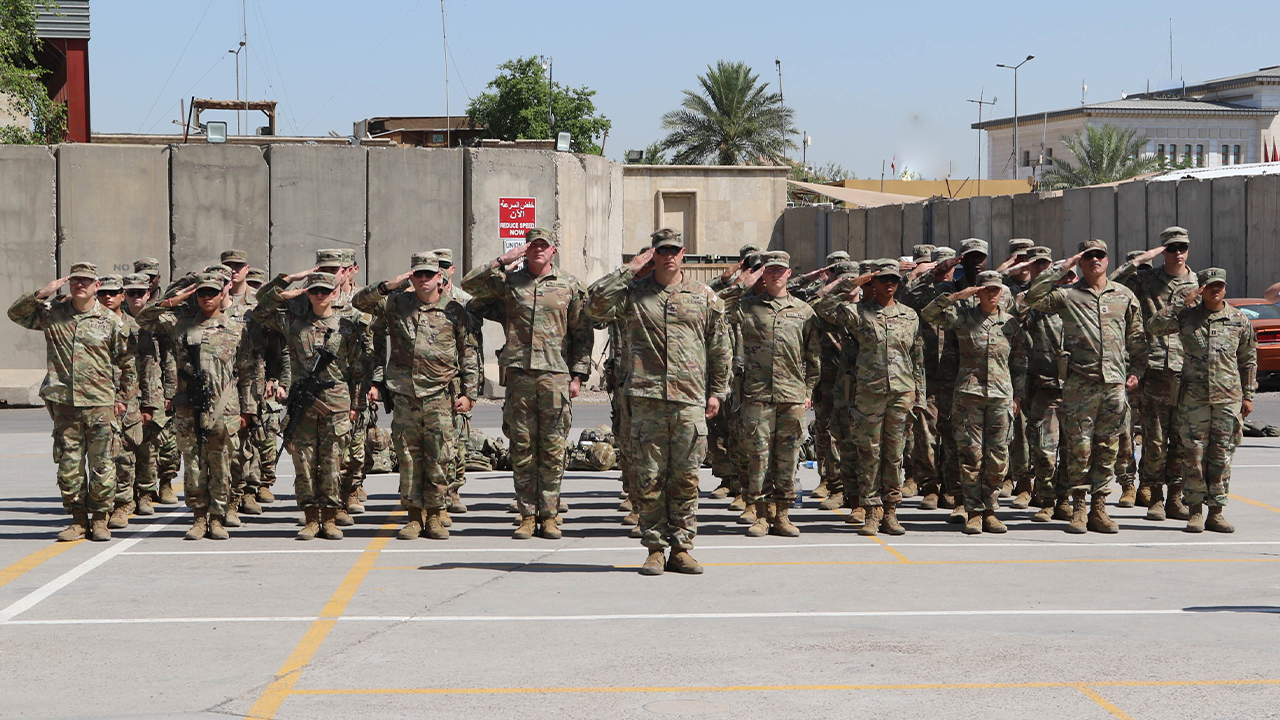
U.S. Military personnel stationed in Baghdad, Iraq held a Memorial Day service Monday to honor the three U.S. Army soldiers who were killed in a drone attack in Jordan earlier this year.
Combined Joint Task Force Operation Inherent Resolve presented the ceremonial wreath at the Memorial Day ceremony at the Union III base, in Baghdad’s Green Zone. Those in attendance paid their respects to the fallen service members.
U.S. Army Maj. Gen. J.B. Vowell, Combined Joint Task Force – Operation Inherent Resolve Commanding General, writes the name of a fallen service member on the Memorial Day wall during a ceremony at Union III in Baghdad, Iraq, May 27, 2024. (U.S. Army)
Staff Sgt. William Rivers, 46, Sgt. Kennedy Sanders, 24, and Sgt. Breonna Moffett, 23, were killed Jan. 28 after a drone attack by an Iranian proxy group hit Tower 22, a small U.S. outpost in northeast Jordan, on the Iraq, Syria, Jordan tri-border, where they were stationed.
BIDEN ADMIN REVERSES COURSE, GRANTS PERMIT FOR CATHOLIC GROUP’S MEMORIAL DAY MASS AT NATIONAL CEMETERY
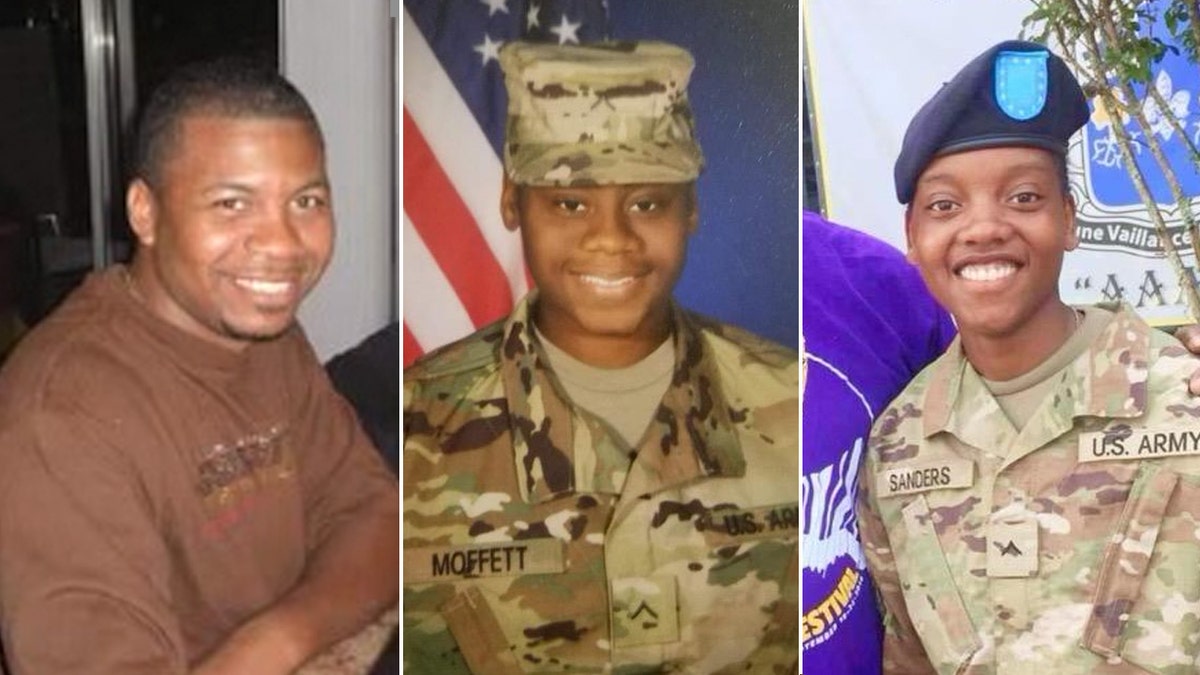
L-R: Sgt. William Rivers, Spc. Breonna Moffett, and Spc. Kennedy Sanders. (Fox News )
The soldiers had been stationed at Tower 22 just across the border from Syria to support the mission to defeat ISIS.
At its height, over 100,000 people lived there, blocked by Jordan from entering into the kingdom at a time when concerns about infiltration by the extremist group were rampant. Those concerns grew out of a 2016 car bomb attack there, that killed seven Jordanian border guards.
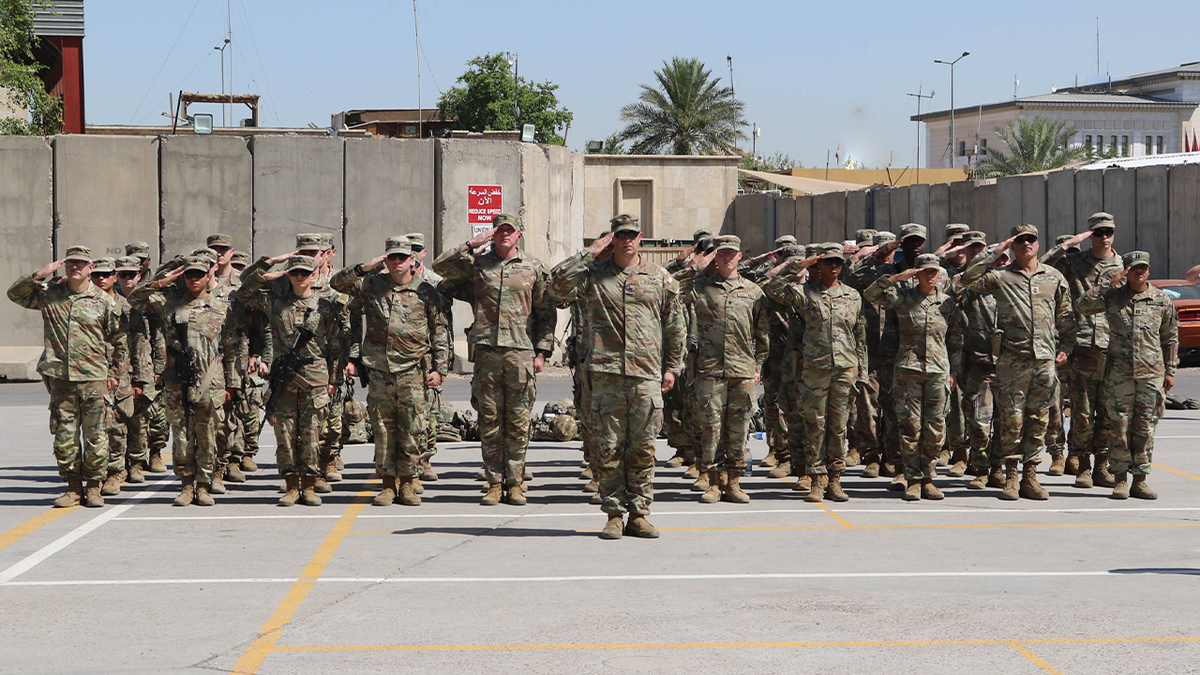
Operation Inherent Resolve soldiers stand in formation and salute the United States flag during a Memorial Day ceremony at Union III in Baghdad, Iraq, May 27, 2024. (U.S. Army)
The camp has dwindled in the time since to some 7,500 people because of a lack of supplies, per United Nations estimates.
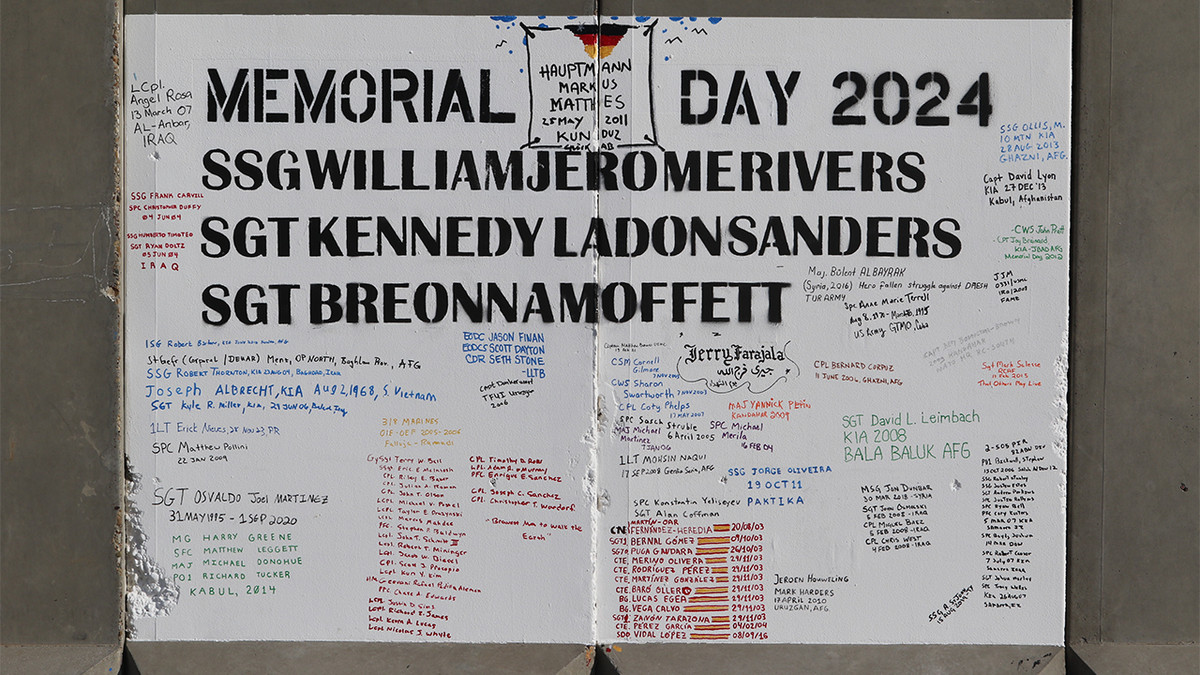
The Memorial Day Wall at Union III in Baghdad, Iraq, May 27, 2024. (U.S. Army)
The base began as a Jordanian border observation outpost, then saw an increased U.S. presence after American forces entered Syria in late 2015. The small installation includes U.S. engineering, aviation, logistics and security troops with about 350 U.S. Army and Air Force personnel deployed there.
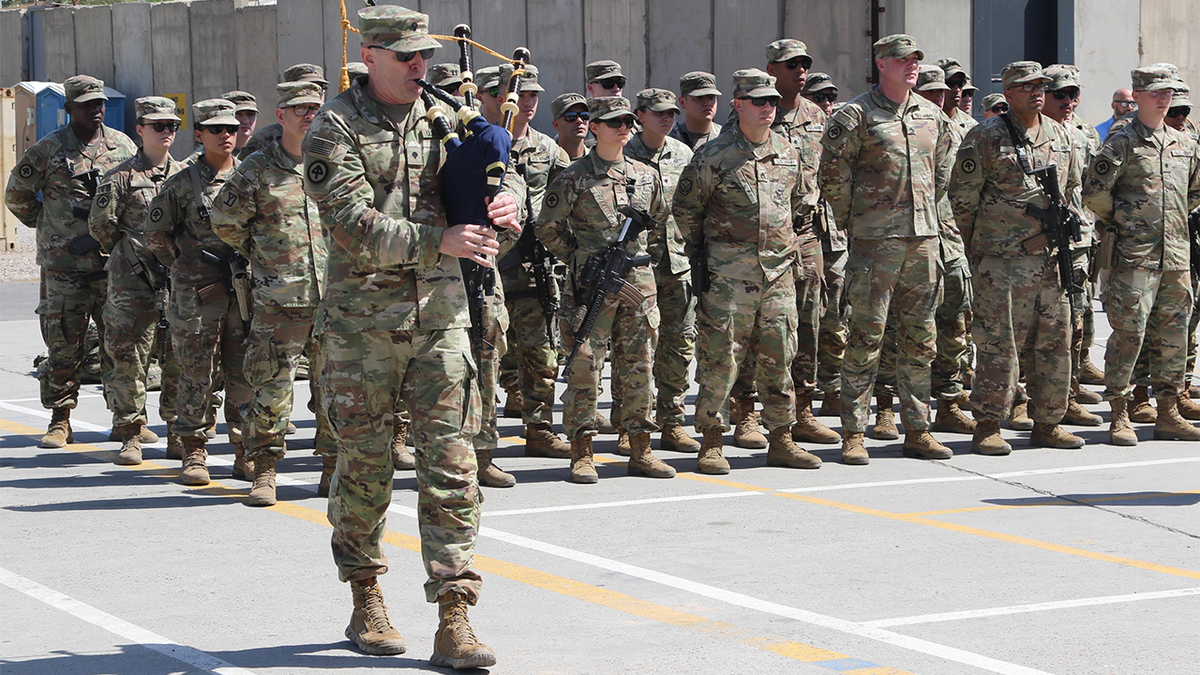
A U.S Army soldier assigned to 1st Battalion, 181st Infantry Regiment, 44th Infantry Brigade Combat Team, New Jersey National Guard, plays Amazing Grace on bagpipes during the Memorial Day ceremony at Union III in Baghdad, Iraq, May 27, 2024. (U.S. Army)
Rivers, Sanders and Moffett were all assigned to the 718th Engineer Company, an Army Reserve unit based in Fort Moore, Georgia, previously known as Fort Benning.
The Associated Press contributed to this report.
World
EU convenes Israel to discuss respect of human rights, ICJ ruling
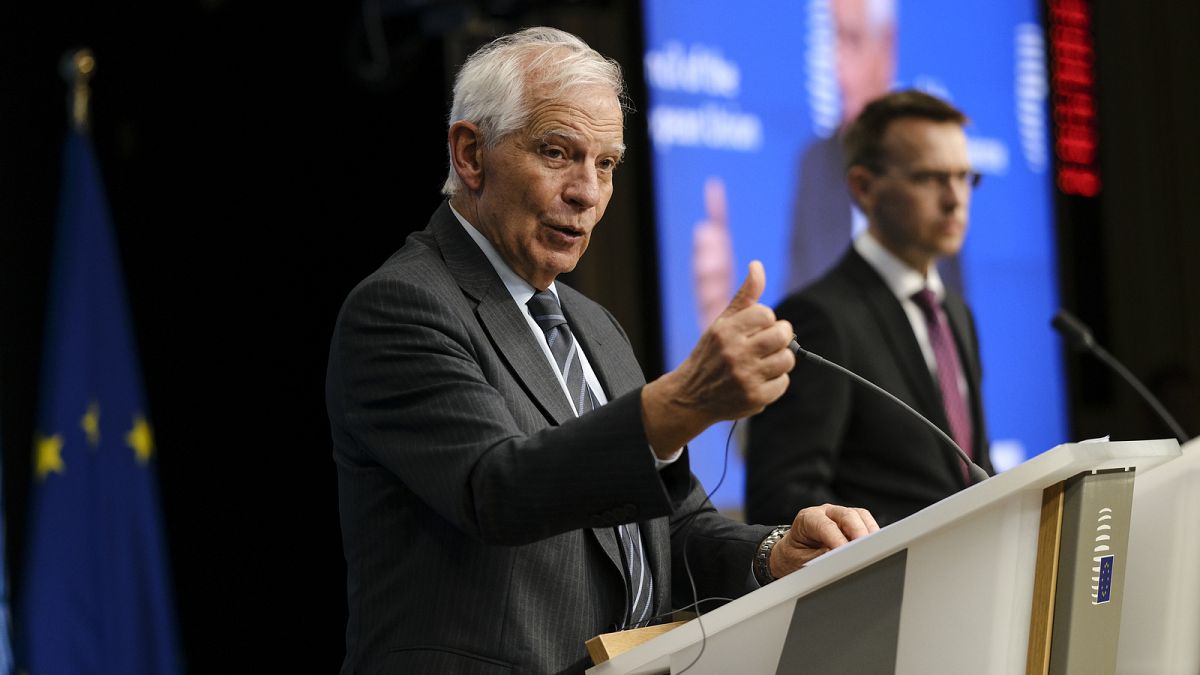
The breakthrough comes three month after Ireland and Spain first pressed on the EU executive to re-open its trade deal with Israel.
European Union foreign ministers unanimously agreed on Monday to call for an Association Council with Israel to discuss the country’s compliance with its human rights obligations under the EU-Israel trade deal, also known as the Association Agreement.
The bloc also intends to use the meeting to confront Netanyahu’s government about its compliance with Friday’s ruling by the International Court of Justice (ICJ), which ordered Israel to halt its intended military offensive in the city of Rafah.
The move comes three months after Spanish Prime Minister Pedro Sánchez and the then Taoiseach Leo Varadkar first made a plea for the urgent review of the EU-Israel Association Agreement, citing serious concerns over Israel’s military campaign in Gaza and potential violations of human rights and international law.
Article 2 of that agreement, struck in 2000, stipulates that the agreement is “based on respect for human rights and democratic principles.”
Europe is Israel’s main trading partner, accounting for just under a third of all commerce, meaning the Agreement is seen as a powerful tool for the bloc to exert pressure on Netanyahu’s war cabinet to refrain from its offensive in the war-torn Gaza Strip.
Despite the firm backing of human rights groups and the UN’s special rapporteur on Palestine, the EU had failed to garner political backing for the move until the breakthrough on Monday.
“We got the necessary unanimity to call for an Association Council with Israel to discuss the situation in Gaza (…) and the respect of human rights under the obligations that Israel has assumed under the Association Council and how they plan to implement the ruling of the court,” Borrell told reporters, referring to Friday’s ruling by the Hague-based court.
“But what we have seen since the court has issued its ruling (is) not the stop of military activities but on the contrary an increase in the military activities, an increase in the bombing and an increase in the casualties to the civilian people, as we have seen last night,” Borrell added.
On Sunday, an Israeli air strike on a camp of displaced Palestinians in the southern Gazan town of Rafah left at least 45 dead, including women and children, prompting global condemnation.
“The last figure seems to be around 40 people, including a small children being burned. I condemn this in the strongest terms. It proves that there is no safe place in Gaza,” Borrell said, describing the images, including those of burnt children, coming out of Rafah as “shocking.”
The IDF has since opened an investigation into the massacre, claiming it was targeting two senior Hamas officials.
EU foreign ministries have harshly criticised the attack, with the German foreign ministry saying the “images of charred bodies” are “unbearable.”
Bloc ups pressure on Israel amid diplomatic spats
Responding to the decision to convene an Association Council, Belgian foreign minister Hadja Lahbib said the move was a “strong signal.”
“We must ensure that our rules and values are respected by all, and above all by our partners like Israel. Our credibility depends on it,” Lahbib, whose government is a staunch supporter of the Palestinians, added.
Other foreign ministers, such as Slovenia’s Tanja Fajon, called for the bloc to go further by slapping sanctions on Israel for its continued violations of international law in its Gaza offensive.
“I strongly condemn Israel’s attack last night on the displaced Palestinians, in which many children were also burned to death,” Fajon, whose government is taking steps to recognise the State of Palestine, said on social media platform X.
“In Brussels (…) today I will stand up for respect for international humanitarian law and decision (of the) ICJ. In case of continuing violations, (the) EU must react uniformly and decisively, including sanctions,” Fajon added.
Borrell declined to comment on whether he believed his Israeli counterparts would agree to attend the Association Council, amid increasing diplomatic tensions with two member states – Ireland and Spain – which announced last Wednesday they would formally recognise the State of Palestine tomorrow, May 28.
A diplomatic row has since erupted, particularly between Israel and Borrell’s native Spain, with Israeli foreign minister Israel Katz issuing a statement Monday morning announcing his government would prohibit Spain from providing consular services to Palestinians in the West Bank.
Katz has also accused Spain’s recognition of Palestine as a “reward for terrorism.”
Borrell described the escalation as “everything but diplomatic.” “This is a completely unjustified and extreme verbal aggression,” he added.
The bloc’s top diplomat also acknowledged there was no unanimous appetite to consider sanctioning Israel for its actions in Gaza but suggested their stance could shift if Netanyahu’s government “continues to ignore” the ICJ’s ruling.
-

 Movie Reviews1 week ago
Movie Reviews1 week ago‘The Substance’ Review: An Excellent Demi Moore Helps Sustain Coralie Fargeat’s Stylish but Redundant Body Horror
-

 Politics1 week ago
Politics1 week agoTrump predicts 'jacked up' Biden at upcoming debates, blasts Bidenomics in battleground speech
-

 World1 week ago
World1 week agoIndia’s biggest election prize: Can the Gandhi family survive Modi?
-

 Finance1 week ago
Finance1 week agoSan Bernardino finance director claims she was fired after raising concerns about costly project
-

 News1 week ago
News1 week agoVideo: A Student Protester Facing Disciplinary Action Has ‘No Regrets’
-

 World1 week ago
World1 week agoPanic in Bishkek: Why were Pakistani students attacked in Kyrgyzstan?
-

 Movie Reviews1 week ago
Movie Reviews1 week ago‘Blue Sun Palace’ Review: An Intimate, Affecting and Dogma-Free Portrait of Chinese Immigrants in Working-Class New York
-

 Movie Reviews1 week ago
Movie Reviews1 week ago‘Rumours’ Review: Cate Blanchett and Alicia Vikander Play Clueless World Leaders in Guy Maddin’s Very Funny, Truly Silly Dark Comedy



















